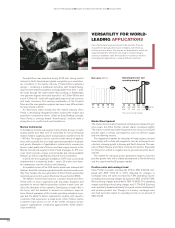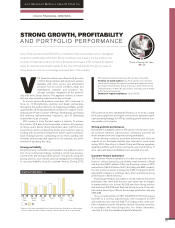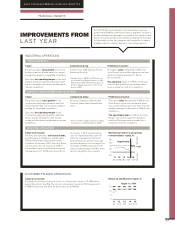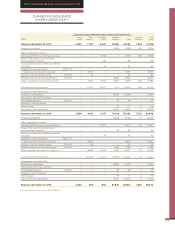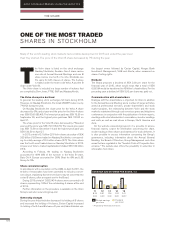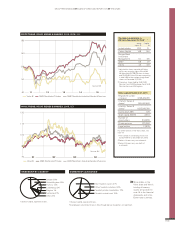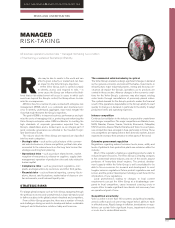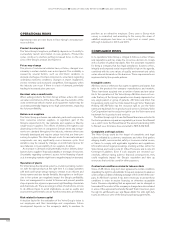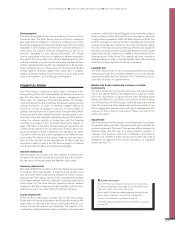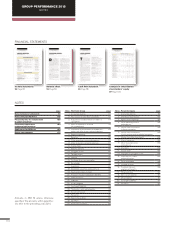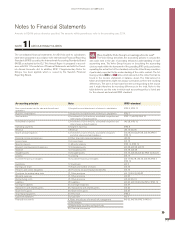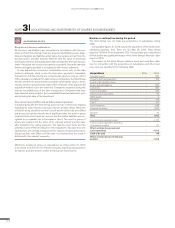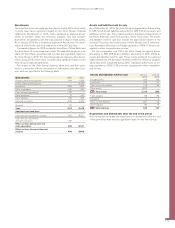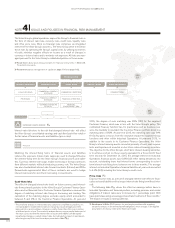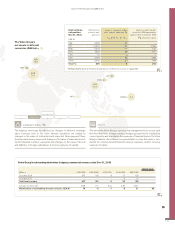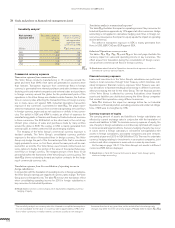Volvo 2015 Annual Report Download - page 110
Download and view the complete annual report
Please find page 110 of the 2015 Volvo annual report below. You can navigate through the pages in the report by either clicking on the pages listed below, or by using the keyword search tool below to find specific information within the annual report.
position as an attractive employer. Every year a Group-wide
survey is conducted, and according to the survey the share of
satisfied employees has been on a high level in recent years,
although it declined in 2014 and 2015.
COMPLIANCE RISKS
In its operations Volvo Group is obliged to follow a number of laws
and regulations and has made the conscious decision to comply
with a number of global standards. Also the corporate reputation
for being a company that has legal compliance, business ethics,
integrity and corporate social responsibility is high on the agenda,
combined with the core values of quality, environment and safety
set as internal demands on the business. These requirements are
implemented by Group-wide policies.
Intangible assets
AB Volvo owns or otherwise has rights to patents and brands that
refer to the products the company manufactures and markets.
These have been acquired over a number of years and are valua-
ble to the operations of the Volvo Group. AB Volvo does not con-
sider that any of the Group’s operations are heavily dependent on
any single patent or group of patents. AB Volvo and Volvo Car
Corporation jointly own the Volvo brand through Volvo Trademark
Holding AB. AB Volvo has the exclusive right to use the Volvo
name and trademark for its products and services. Similarly, Volvo
Car Corporation has the exclusive right to use the Volvo name and
trademark for its products and services.
The Volvo Group’s rights to use the Renault brand are restricted to
the truck operations only and are regulated by a license from Renault
s.a.s., which owns the Renault brand. The amount paid during 2015
to Renault s.a.s. for license fees amounted to SEK 6.4 M (6.0).
Complaints and legal actions
The Volvo Group could be the target of complaints and legal
actions initiated by customers, employees and other third parties
alleging health, environmental, safety or business related issues,
or failure to comply with applicable legislation and regulations.
Information about legal proceedings involving entities within the
Volvo Group are found in note 21 Other Provisions and in note 24
Contingent Liabilities. Even if such disputes are resolved suc-
cessfully, without having adverse financial consequences, they
could negatively impact the Group’s reputation and take up
resources that could be used for other purposes.
Contractual conditions related to takeover bids
Some of AB Volvo’s long term loan agreements contain conditions
stipulating the right for a bondholder to request repayment in advance
under certain conditions following a change of the control of the com-
pany. In AB Volvo’s opinion it has been necessary to accept those
conditions in order to receive financing on otherwise acceptable
terms. Provisions stipulating that an agreement can be changed or
terminated if the control of the company is changed are also included
in some of the agreements whereby Renault Trucks’ has been given
the right to sell Renault s.a.s.’ and Nissan Motor Co. Ltd’s light-duty
trucks as well as in some of the Group’s purchasing agreements.
OPERATIONAL RISKS
Operational risks are risks found in Volvo Group’s everyday busi-
ness activities.
Product development
The Volvo Group’s long-term profitability depends on its ability to
successfully launch and market its new products. Product life
cycles continue to shorten, putting increased focus on the suc-
cess of the Group’s product development.
Prices may change
The prices of commercial vehicles have, at times, changed con-
siderably in certain markets over a short period. This instability is
caused by several factors, such as short-term variations in
demand, shortages of certain components, uncertainty regarding
underlying economic conditions, changes in import regulations,
excess inventory and increased competition. Overcapacity within
the industry can occur if there is a lack of demand, potentially
leading to increased price pressure.
Residual value commitments
When selling products the Volvo Group at times enters into resid-
ual value commitments. At the time of the sale the evolution of the
used commercial vehicle market and equipment market may be
uncertain, potentially leading to too high commitments, impacting
the future profitability.
Reliance on suppliers
The Volvo Group purchases raw materials, parts and components
from numerous external suppliers. A significant part of the
Group’s requirements for raw materials and supplies is filled by
single-source suppliers. The effects of delivery interruptions vary
depending on the item or component. Certain items and compo-
nents are standard throughout the industry, whereas others are
internally developed and require unique tools that are time-con-
suming to replace. The Volvo Group’s costs for raw materials and
components can vary significantly over a business cycle. Cost
variations may be caused by changes in world market prices for
raw materials or by an inability of our suppliers to deliver.
An increase in demand could potentially result in delivery distur-
bances due to suppliers’ financial instability or shortage of resources.
Uncertainty regarding customers’ access to the financing of prod-
ucts in emerging markets might have a negative impact on demand.
Operation of plants
For Volvo Group the industrial system is crucial in providing custom-
ers with the right products at the right time. It is a large operation
with tools and human beings having to interact in an efficient and
timely manner and also handle flexibility. Interruptions or inefficien-
cies in the system can negatively impact the Group’s profitability.
Here risk management is crucial to foresee and prevent possible
stops in production, injuries on personnel, right handling of materials
and chemicals, etc. There are a large number of instructions on how
to do different tasks to avoid implications, as well as audits and
assessments performed to secure that the instructions are followed.
Risk related to human capital
A decisive factor for the realization of the Volvo Group’s vision is
our employees and their knowledge and competence. Future
development depends on the company’s ability to maintain its
GROUP PERFORMANCE BOARD OF DIRECTORS’ REPORT 2015 RISKS AND UNCERTAINTIES
108


